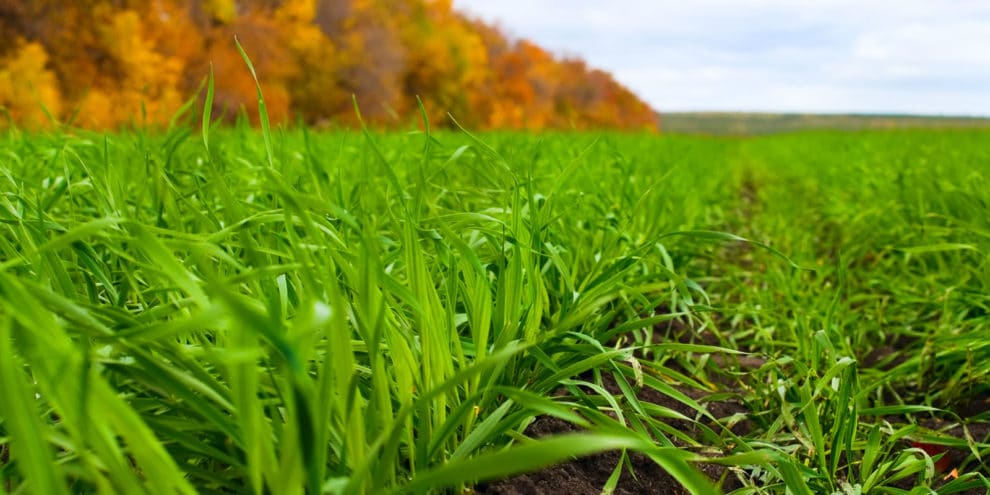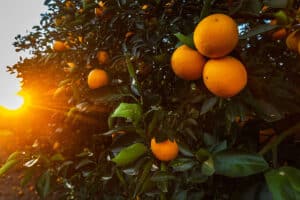When it comes to agricultural production methods, no two operations are the same. As an investor, it’s important to know the differences between production types, dispel common myths, and understand how it all affects the farmer, the market for the commodity, and your portfolio.
The Growing Demand for Organically Produced Food
The United States Department of Agriculture defines an organic product as one that has “been produced using cultural, biological, and mechanical practices that support the cycling of on-farm resources, promote ecological balance, and conserve biodiversity.”
Organic farming is a production method trend which has increased significantly in recent years. U.S. organic food sales grew to $56.4 billion in 2020, up from $50 billion in 2019, according to the Organic Trade Association. The demand for organic produce isn’t stopping there; the global organic market is expected to reach nearly $850 billion by the year 2028.
It’s safe to say the “organic” trend isn’t going away anytime soon, but what does that word really mean? How does it compare to conventional farming methods?
Organic Farming
- Can use naturally occurring pesticides, herbicides, and fertilizers
- Can use naturally occurring chemicals
- Does not allow the use of Genetically Modified Organisms (GMOs)
- Requires more land for production
Conventional Farming
- Can use synthetic pesticides, herbicides, and fertilizers
- Can use synthetic chemicals
- Can use GMOs
- Requires less land for production
It is a commonly held belief that food grown “organically” is produced without the use of pesticides, but this is not true. Both organic and conventional farming methods use pesticides; the difference lies in the source. Organic producers can use pesticides that are naturally occurring, while conventional producers can use synthetic pesticides. In both cases, pesticides help keep pests and other plant disease carriers at bay, which helps the farmer produce a safer product for consumers. Organic and conventional farming also use different fertilizer products.
One main difference between organic and conventional methods is the use of GMOs, which are prohibited in organic production. Conventional farmers can implement genetically modified crops, which are engineered to have resistance against pests, diseases, and certain weather conditions, such as drought. GMOs can serve as a useful tool in helping to prevent crop loss, which allows farmers to produce a higher yield with less land usage. While there is no evidence of non-GMO products being safer or healthier, GMO-free claims are important to more than 55 percent of consumers, making it a popular marketing tactic to use for packaging and promotion.
The most important thing to remember is that food from both production method types undergoes strict evaluation by the USDA and EPA to ensure it is safe to consume, so the great debate over “organic vs. conventional” comes down to personal preference. As an agricultural investor looking to fund an operation, it’s useful to know these key differences. They will likely impact the operation size, protocols, and demand for the commodity it produces.
This content may not be used or reproduced in any manner whatsoever, in part or in whole, without written permission of LANDTHINK. Use of this content without permission is a violation of federal copyright law. The articles, posts, comments, opinions and information provided by LANDTHINK are for informational and research purposes only and DOES NOT substitute or coincide with the advice of an attorney, accountant, real estate broker or any other licensed real estate professional. LANDTHINK strongly advises visitors and readers to seek their own professional guidance and advice related to buying, investing in or selling real estate.










So much of what has been written here is untrue:
1) “In both cases, pesticides help keep pests and other plant disease carriers at bay, which helps the farmer produce a safer product for consumers.”
– the function of pesticides is not to produce a safer product. This is simply non-sense. The function of a pesticide is to protect the plant from spoiling due to pests or diseases. The consumer is not at any risk when a crop is not treated with pesticides, organic or conventional, and to suggest otherwise is imply irresponsible.
– in the case of conventional crops, farmers often use RoundUp or their choice of many other dangerous pesticides, most of which have been banned for years in Europe and other countries due to the studies that have shown far higher incidence of cancers, non-hodkins lymphomas and endocrine and fertility problems in humans.
2) “While there is no evidence of non-GMO products being safer or healthier, GMO-free claims are important to more than 55 percent of consumers, making it a popular marketing tactic to use for packaging and promotion.”
– there are plenty of scientific studies done which have proved that when non-GMO crops are planted in conjunction with their intended pesticide usage (RoundUp and others), they pose significantly higher risk of disease for the consumer. The seeds in GMO crops were bred to specifically resist any harm from the pesticide which will kill every weed and pest, but not the crop. The issue isnt as much the plant as the synthetic pesticide which is dangerous. As pests and weeds have become more resistant to RoundUp and other pesticides, the conventional farmer then needs to use stronger doses or spray more often to have the intended effect. There are many studies and documentaries by conventional farmers who have shown this – they cannot understand why the weeds are no longer dying. Some will no longer let their kids eat the crops they grow because they are afraid of the amount of chemicals they are using to stay in business. And, the more synthetic pesticides used, the more that wash into waterways and into groundwater that we drink.
3) “The most important thing to remember is that food from both production method types undergoes strict evaluation by the USDA and EPA to ensure it is safe to consume, so the great debate over “organic vs. conventional” comes down to personal preference”.
– on the contrary. The lack of enforcement by the USDA and EPA programs has been well-documented for many years. Similarly, Big Ag along with Monsanto/Bayer and Syngenta, companies which manufacture some of the most dangerous pesticides in the world, and make the GMO seeds, have the strongest lobbying groups in our country, which is why farmers continue to have access to the most dangerous pesticides in the world, while other countries have banned them. As manufacturers find pesticide-resistance increasing, they force politicians to approve new laws to allow increased levels of these pesticides or those political campaigns will no longer be funded. The conventional farmers have little choice but to go along so that they can get a stronger pesticide and stay in business, all while the manufacturers fund the health studies which indicate there are no risks. If that were true, why have so many countries, including Mexico banned these pesticides?
Your buyers would be well-advised to do their due-diligence if they want to raise crops or even just grow their own food. You have accurately pointed out that the trend toward organic eating and growing will increase dramatically in the future. So buying a property that has been farmed intensively with synthetic pesticides would likely be a serious problem for a buyer wishing to farm and possibly a poor long-term investement.
Well Said Bill. As a Physician, I can share story after story of neurologic diseases in Farmers… using the chemicals and gmo seeds… etc.. Overlay Round up with Parkinson’s disease, Autism, MS.. the timing is pretty surreal.. this goes well beyond the known cancer risks.. The pesticides are endocrine disruptors, they cause early puberty, early menopause, likely some of the hormone imbalances we are seeing in our kids can be attributed to the processed, chemical laden food they are eating.. Our bodies are not able to handle the chemicals, process the food full of the gmo’s.. I can go on all day about the need to protect our soil, protect our water, and protect our food. We are looking for land and that is a struggle, to make make sure to find water that does not have runoff from Ag using chemicals upstream, that did not have land that is sprayed.. This article was very poorly written and written with a political stance that Pesticides and chemicals do not matter and “are not harmful”. While bayer has endless pockets, they are feeling the lawsuits (Monsanto) that they are losing.. that should tell you something. The “trend” to organic is not going away, its people doing the research and learning that hey, I can change the way I eat and feel better, and live longer and healthier.. Once you are eating clean, and then you eat a steak that has been raised on sprayed crash and gmo heavily sprayed corn, you actually can feel it, Restless leg, headache, swelling, body aches.. that is not just a fluke.. Our dream is to raise cattle that is organic with grass fed and organic sprout finished or grass finished.. avoiding the grains all together. For those reading: EWG.org puts out the most heavily sprayed fruits and veggies yearly. we do not eat them unless they are organic and even then, washed.. and you have to see how your meat is finished, if its organic, then at least the corn was not sprayed/gmo’s.. ALSO: Non GMO does not mean no chemicals. It can still be heavily sprayed with pesticides. it must say organic to be chemical free.. and with that, if someones product is written organic but not USDA certified, I believe them, the fine to say it without it being true is steep, but small good farmers do not have the cash on hand to get USDA certified organic. Its ridiculous how much it costs. that is a whole other story.